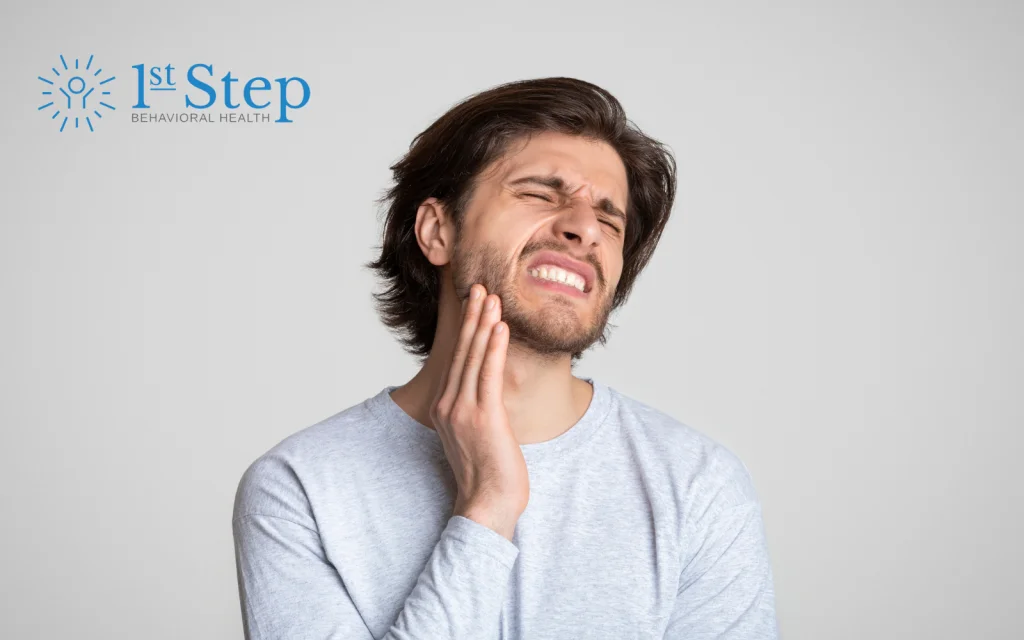Cocaine is a powerful and addictive drug that is made from the leaves of the coca plant (Erythroxylon coca).[1] The leaves are refined into a fine white powder that is sold for recreational use and may be snorted, smoked, or injected. Shortly after ingestion, cocaine stimulates the central nervous system (CNS), resulting in a wave of euphoria, increased energy and alertness, and heightened confidence and sociability.
While people abuse cocaine to get high, cocaine can also cause unwanted side effects including excessive clenching of the jaw muscles and grinding of the teeth. These mouth movements and their consequences are known as “cocaine jaw” or “coke jaw.”
In this article, you will learn:
- What coke jaw is
- What causes it
- The potential dangers
- Treatment options for cocaine abuse
If you or a loved one are struggling with cocaine addiction, please reach out to First Step Behavioral Health to discuss your treatment options.
What is Cocaine Jaw?
Cocaine jaw is a common side effect of cocaine abuse.[2] It describes repetitive jaw clenching or grinding that is often observed in people who are under the influence of cocaine.
The causes of these jaw movements are a result of the stimulant effects of cocaine on the body. Cocaine releases and inhibits the reuptake of feel-good neurotransmitters like dopamine and serotonin.[3] Like other stimulants, this can cause muscle hyperactivity and uncontrollable movements, including those that impact the jaw and rest of the face.
Symptoms of Coke Jaw
The most common sign of cocaine jaw is clenching the mouth or grinding the teeth. Some people may also display jerking motions with their jaw. These symptoms can be observed both by the individual and others around them.
Other signs include:
- Facial soreness
- Increased tooth sensitivity
- Headaches
- Jaw stiffness
- Jaw pain
- Difficulty or pain when opening or closing the mouth
- Hearing clicking or popping noises in the jaw
- Limited range of motion in the jaw
- Tinnitus (ringing of the ears)
People with symptoms of cocaine jaw may develop bruxism, which is a condition in which they gnash or clench their teeth together unconsciously while awake or asleep.
Long-Term Consequences
Cocaine abuse can lead to significant dental problems. Frequently grinding one’s teeth can wear down the enamel, leading to tooth sensitivity, cavities, and even tooth loss. Additionally, constantly clenching one’s jaw can cause disorders of the temporomandibular joint (TMJ), leading to discomfort and chronic pain.[4]
Bruxism can damage oral health in a number of ways, including:
- Sore, tight, or fatigued jaw
- Headaches
- Facial pain
- Cracking, chipping, loosening, or flattening of the teeth
- Wearing away at the teeth’s enamel
- Increased tooth sensitivity to hot or cold temperatures
- Muscle fatigue
In addition to TMJ disorders, dental problems, and tooth damage, coke jaw can also have a significant psychological impact. People may experience embarrassment, reduced self-confidence, anxiety, depression, and self-esteem issues.
Treatment for Cocaine Jaw
Bruxism and teeth grinding caused by cocaine can be relieved by abstaining from cocaine and seeking appropriate dental treatment. Treatment options include:
- Oral devices – A dentist can take a mold of your mouth and order a customized night guard or mouth guard device that stops you from being able to clench or grind your teeth. While these appliances can’t stop the grinding or clenching themselves, they can protect your teeth and gums from the effects.[5]
- Relaxation techniques – Relaxation techniques can help alleviate tension and jaw pain. These techniques include meditating and deep breathing to reduce stress, applying a warm compress to the affected area, and doing jaw exercises as directed by your doctor or dentist.
- Cognitive behavioral therapy (CBT) – Behavioral therapy can help address stress, teach healthy coping skills, and address the root causes of substance abuse.
Treatment for Cocaine Addiction
Cocaine jaw can be treated, but only if you stop using cocaine. The sooner you quit, the sooner you’ll experience relief.
Cocaine addiction treatment happens in stages:
- Detox – Medically supervised process to safely manage withdrawal symptoms and cleanse the body of cocaine.
- Residential treatment – Intensive therapy and support in a live-in facility to address underlying issues and develop coping skills.
- Outpatient treatment – Flexible therapy and counseling sessions while living at home to continue recovery progress.
- Aftercare – Ongoing support and resources are given to clients after treatment so they can maintain sobriety and prevent relapse.
If you or a loved one are struggling, don’t hesitate to seek professional help.
Find Help Now
Long-term cocaine abuse can damage more than just your dental and oral health. Cocaine is a powerful stimulant drug that is linked to cardiovascular disease, stroke, overdose, and other life-altering health problems. If you or a loved one are struggling with cocaine addiction, we urge you to take the first step toward recovery by contacting us today.
First Step Behavioral Health is a licensed dual-diagnosis long-term addiction treatment facility that is accredited by the Joint Commission. We focus on the physiological rebalancing of the individual through medical, physical, emotional, mental, and spiritual care. Our comprehensive cocaine rehab program is here to help you detox safely and establish a life outside of your addiction.
To learn more about our treatment programs or get started with a confidential, risk-free assessment, please contact us today.
References:
- National Institute on Drug Abuse (NIDA): Cocaine
- National Institutes of Health (NIH): Oral motor parafunctions among heavy drug addicts and their effects on signs and symptoms of temporomandibular disorders
- Thomas Jefferson University: Cocaine Effects on Norepinephrine in the Amygdala
- The Journal of Nuclear Medicine: Cocaine Abuse and Bruxism: Temporal Mandibular Joint Evaluation using FDG-PET/CT
- Johns Hopkins Medicine: Bruxism
Jump to a Section
Call (855) 425-4846
